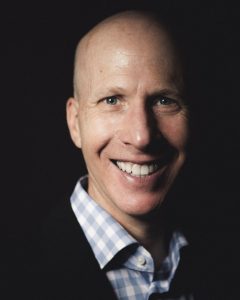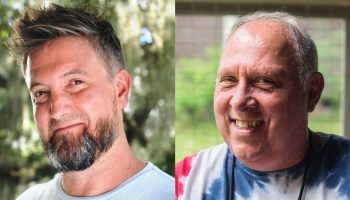Word by word — page after page — chapter upon chapter. And finally, book following book. The bookwriting process requires guts to start and grit to finish; personal and professional integrity to get it right; and excellence to win awards.
Author, biographer and journalist Jonathan Eig has completed this process repeatedly. Beginning with Luckiest Man: The Life and Death of Lou Gehrig, Eig has written five nonfiction books. He is currently working on his sixth, a biography of Martin Luther King Jr.

Eig has also served as an expert for two Ken Burns films — “Prohibition” and “Jackie Robinson.” And with cheerful tenacity, he convinced Burns to find the time to make a documentary about another topic Eig has become an authority on, Muhammad Ali, and to hire Eig as a consulting producer.
At 2 p.m. on Saturday in the Hall of Philosophy, Eig will present the concluding lecture of the Chautauqua Women’s Club’s 2019 Contemporary Issues Forum. Titled, “Life of Muhammad Ali,” it draws on his extensively researched, multiple award-winning, New York Times best-selling biography, Ali: A Life.
Eig has taught and spoken about his work at Chautauqua Institution several times since he first set foot on the grounds during the 2010 season. On Thursday, he gave a talk about Gehrig at the Sports Club.
“A friend of mine (from Chicago) … thought I would like (the Institution) and suggested that I come talk about Lou Gehrig,” Eig said. “And he convinced the Cinema to show ‘The Pride of the Yankees’ (about New York Yankees first baseman, Lou Gehrig) and then have me speak about the movie after it was over. And then Mark Altschuler invited me to co-teach a baseball class with Special Studies. So these friends just sort of found a way to get me engaged here.”
Since then, Eig has served as a prose writer-in-residence at the Chautauqua Writers’ Center three times.
“What I hope to do (on Saturday) … is to not just talk about Ali, but to talk about the responsibilities of writing a biography, and how that connects to our theme of the week, which is bridging cultures,” Eig said.
When “you read or write a biography, you’re basically engaging in an act of trying to understand someone other than yourself,” he said. “That’s by definition. I think that’s such an important part of what the lectures this week have been discussing — thinking about what you’re missing.”
Eig got an early start making a career of trying to understand others well enough so that he could write wisely about them.
Born in Brooklyn, he grew up about 30 miles to the north in the Rockland County hamlet of Monsey, and enjoyed being a reporter for his junior and senior high school newspapers so much that he wondered what else he could do.
“I just called the (Rockland County Journal News) and asked if I could do anything,” he said. “I didn’t know anybody. I’d never met a reporter. But … I just thought … ‘I’ll call the sports department and see if I can get any work over there.’ ”
The Journal News hired Eig when he was just 16, to telephone coaches, find out the scores of the games and then phone all of the scores in to the newspaper’s sports desk. Eventually he was asked to come into the office, and later to go out and report on local games.
“When I got my first chance to go out and cover a game and get a byline, that was huge,” Eig said. “I can still remember who played — it was Clarkstown North High School vs. Ramapo High School.”
Certain that journalism was what he wanted to do, he enrolled in Northwestern University’s high school journalism program, was accepted at Northwestern for college, and “absolutely loved it.”
“I worked at the school paper every day from freshman year to senior year,” Eig said. “And I mean every day. And then … I had (summer) internships. … The first was in Westchester, New York. Then I got an internship at the L.A. Times in their Washington, D.C. bureau. I actually got to cover Ronald Reagan White House press conferences.”
The New Orleans Times-Picayune hired Eig straight out of Northwestern, and he stayed for nearly four years, from 1986 to 1990. He said that initially he was assigned to the suburbs, but after a year, he requested the public housing beat — though such a beat didn’t exist.
“I asked if they would give me that beat because I just thought it was so interesting and … 10% of the city … lived in public housing and nobody was covering it,” Eig said. “And it was like another world to me. I’d never seen anything like it — the poverty, and … the size of those communities, and their density. … I mostly covered crime and urban affairs … and public housing.”
Moving from New Orleans to Dallas, Eig worked for The Dallas Morning News for five years. For a short while, he covered the education beat, then poverty and social services.
“I also volunteered to be the jazz critic … because they didn’t have a jazz critic,” Eig said. “So I just raised my hand and I got to cover jazz. And I met all these great legends and I interviewed them — Dizzy Gillespie and Ella Fitzgerald and Sonny Rollins.”
To be near his girlfriend (and later his wife), who had decided to earn a master’s degree in public policy at the University of Chicago, Eig moved to Chicago without a job. He said he freelanced for a year “for anybody” in order to earn a living — including jazz magazines, Cosmopolitan and the magazine owned by the tobacco company Marlborough — before landing a full-time position as a staff writer at Chicago magazine.
Freelancing helped Eig think entrepreneurially about how to come up with ideas for stories he could sell. And magazine writing got him started on longer-form — 6,000 to 7,000-word — stories. Both would become important for book writing.
At Chicago magazine, Eig said he wrote stories about crime and a profile of Michael Jordan at the height of the basketball legend’s career.
“One of my favorite stories was about … one of my real mentors at Northwestern, … a professor named Leon Forrest, who wrote what I consider the greatest unknown African American novel of them all,” Eig said. “It’s called Divine Days. And he called me when he was diagnosed with cancer and asked if I would basically come and interview him because he wanted to be remembered. He felt like his work was unappreciated.”
Eig said that he spent the last few months of Forrest’s life writing about his attempt to finish one more novel.
“I learned a lot from that experience and from being with him,” he said. “And asking anybody, when you interview them, to share their life story is a big commitment and a big request, but when somebody is on their deathbed and wants someone to listen to them, that’s an awesome responsibility.”
And Toni Morrison was Forrest’s editor.
“She’s the one who said to me: ‘Someday his work is going to be appreciated, and make sure you save those tapes of your interviews with him,’ ” Eig said. “Which of course, I did.”
In 2000, Eig left Chicago magazine for the Wall Street Journal, where he wrote about major food companies until he was allowed to write what he wanted.
“It was while I was at the Wall Street Journal that I had an idea for a book,” Eig said. “I did the Gehrig book almost entirely while I was working full time at the Journal. I took, I think, three months off at the end, which coincided with my daughter being born, so I got paternity leave.”
Luckiest Man was published in 2005.
He returned to the Journal for about a year, before taking a leave to work on his second book, Opening Day: The Story of Jackie Robinson’s First Season, which came out in 2007.
Thereafter, Eig decided to focus on book writing full time.
Get Capone: The Secret Plot that Captured America’s Most Wanted Gangster came next in 2010; followed by The Birth of the Pill: How Four Crusaders Reinvented Sex and Launched a Revolution in 2015; and Ali: A Life in 2017.
Eig said he met filmmaker Lynn Novick when she interviewed him for Burns’ documentary, “Prohibition.” At the time, he was in the process of writing Get Capone.
“I became their Capone expert,” he said. “I loved the process of learning about how they made these films and I wanted to learn more about it, so I just began suggesting ideas to them.”
When they made “Jackie Robinson,” Eig was again involved as an expert.
“I suggested to Ken that Ali would make a great subject for a documentary, and then I just began bugging him a lot,” he said. “… And after a while, they came around. And now they are really doing it. … It’s probably three-quarters done, and I’ve been a consultant on it.”
Meanwhile, Eig’s podcast series, “Chasing Ali,” provides a fun way to learn about some of the challenges he faced while researching Ali, including getting an interview with Ali himself.
To Eig, editing film transcripts and writing lengthy books feels like journalism.
“I’ve never really done anything else,” he said. “Since I was 16, I’ve been doing the same thing. … I’m gathering facts, I’m interviewing people and I’m writing it up. It’s the exact same thing I did at 16, when I covered Ramapo vs. Clarkstown North. It’s longer. It’s like running the ultra-marathon instead of running down the street.”




